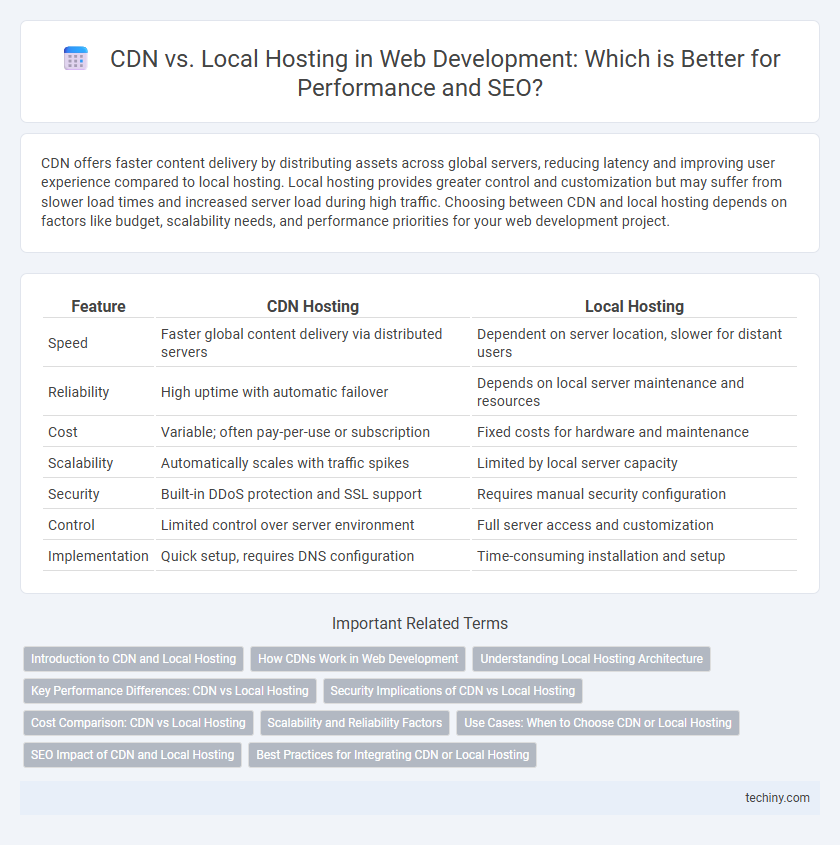CDN offers faster content delivery by distributing assets across global servers, reducing latency and improving user experience compared to local hosting. Local hosting provides greater control and customization but may suffer from slower load times and increased server load during high traffic. Choosing between CDN and local hosting depends on factors like budget, scalability needs, and performance priorities for your web development project.
Table of Comparison
| Feature | CDN Hosting | Local Hosting |
|---|---|---|
| Speed | Faster global content delivery via distributed servers | Dependent on server location, slower for distant users |
| Reliability | High uptime with automatic failover | Depends on local server maintenance and resources |
| Cost | Variable; often pay-per-use or subscription | Fixed costs for hardware and maintenance |
| Scalability | Automatically scales with traffic spikes | Limited by local server capacity |
| Security | Built-in DDoS protection and SSL support | Requires manual security configuration |
| Control | Limited control over server environment | Full server access and customization |
| Implementation | Quick setup, requires DNS configuration | Time-consuming installation and setup |
Introduction to CDN and Local Hosting
Content Delivery Network (CDN) is a distributed network of servers that delivers web content based on the user's geographic location, ensuring faster load times and reduced latency. Local hosting involves storing and serving web assets directly from a single server or data center controlled by the website owner, providing greater control over files and security measures. Choosing between CDN and local hosting impacts website performance, scalability, and maintenance depending on traffic patterns and user distribution.
How CDNs Work in Web Development
Content Delivery Networks (CDNs) function by distributing website assets across a global network of servers, reducing latency and improving load times by delivering content from the nearest server to the user. In web development, CDNs optimize static resource delivery such as images, scripts, and stylesheets, ensuring faster rendering and better user experience. This distributed caching system also enhances scalability and mitigates server load, making websites more resilient to traffic spikes.
Understanding Local Hosting Architecture
Local hosting architecture involves storing website files and assets on servers physically located within an organization or a dedicated data center, enabling direct control over server configurations, security protocols, and hardware resources. This setup can improve website performance by reducing latency, especially for localized user bases, and enhances data privacy since sensitive information remains on-premises. Effective management of local hosting requires robust infrastructure, including SSD storage, reliable network connectivity, and backup systems to ensure high availability and scalability.
Key Performance Differences: CDN vs Local Hosting
CDN significantly reduces latency by delivering content from geographically distributed servers, enhancing load times and user experience compared to local hosting, which relies on a single server location. Bandwidth efficiency is higher with CDN due to data caching and load balancing, decreasing server strain and reducing the risk of downtime inherent in local hosting. Security benefits of CDN include DDoS protection and SSL management, whereas local hosting often requires additional configurations to achieve similar levels of security.
Security Implications of CDN vs Local Hosting
Content Delivery Networks (CDNs) enhance security by providing distributed denial-of-service (DDoS) protection, web application firewalls (WAFs), and automatic SSL certificate management, reducing the risk of attacks and data breaches. Local hosting requires rigorous manual implementation of security protocols, including firewall configurations, regular patch management, and secure server maintenance to prevent vulnerabilities. While CDNs offer robust, scalable security features, local hosting demands advanced technical expertise to achieve comparable protection against cyber threats.
Cost Comparison: CDN vs Local Hosting
CDN reduces bandwidth costs by distributing traffic across multiple servers, minimizing data transfer expenses compared to local hosting. Local hosting incurs higher infrastructure and maintenance costs, requiring investment in servers, power, and technical support. For scalable websites with fluctuating traffic, CDN offers more cost efficiency by optimizing resource usage and reducing latency-related expenses.
Scalability and Reliability Factors
Content Delivery Networks (CDNs) significantly enhance scalability by distributing web assets across multiple global servers, reducing load on origin servers and ensuring faster delivery during traffic spikes. Local hosting, while offering greater control, often struggles with scaling demands and can suffer from single points of failure, affecting reliability. CDNs provide built-in redundancy and failover mechanisms that improve uptime and ensure consistent user experience even under high traffic conditions.
Use Cases: When to Choose CDN or Local Hosting
CDN is ideal for websites with a global audience requiring fast load times and reduced latency by delivering cached content from edge servers close to users. Local hosting suits small-scale websites or applications prioritizing greater control, customization, and security within a specific geographic region. Choosing CDN enhances scalability and performance during traffic spikes, while local hosting supports development environments and sensitive data handling.
SEO Impact of CDN and Local Hosting
CDN improves SEO by reducing page load times globally, enhancing user experience and decreasing bounce rates, which search engines favor. Local hosting can provide faster speeds for a specific geographic audience but may limit scalability and global performance consistency. Search engines prioritize websites with quick, reliable access, making CDN a superior choice for SEO in broader markets.
Best Practices for Integrating CDN or Local Hosting
Choosing between CDN and local hosting depends on factors like target audience location and website performance goals. Implementing a CDN enhances global content delivery speed through distributed servers, while local hosting allows greater control and potentially lower latency in specific regions. Best practices include combining both methods by caching static assets on a CDN and maintaining dynamic content on local servers to optimize load times and reliability.
CDN vs Local Hosting Infographic

 techiny.com
techiny.com